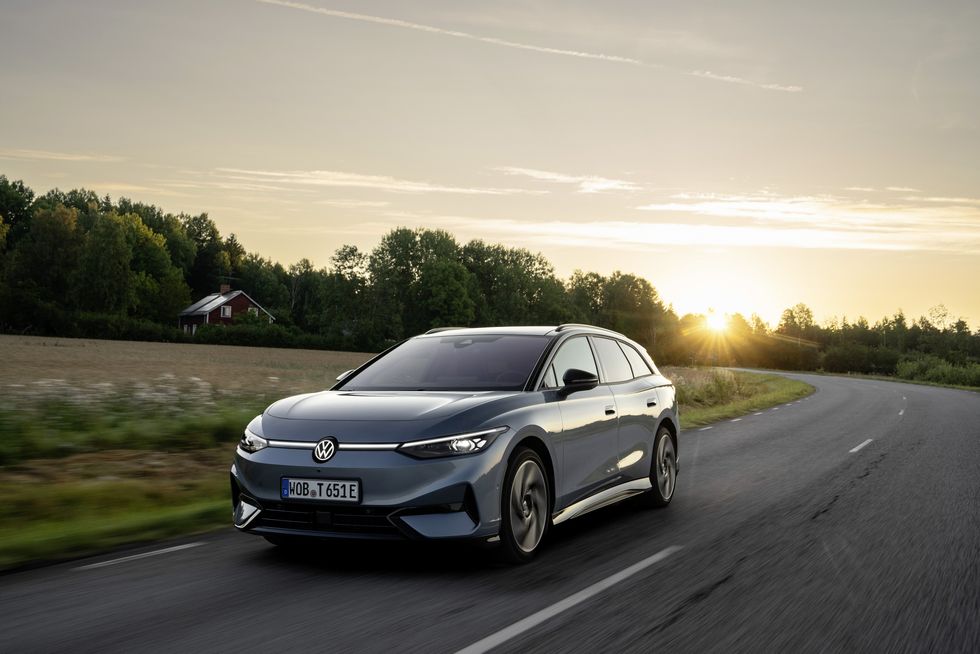Volkswagen has “a year, maybe two” left to adapt to the switch to electric cars despite a drop in demand from customers who fear the vehicles do not have the required range or are too expensive to purchase.
It has been reported that the German company has looked into closing factories in the nation as it warns of a “serious situation” relating to the job security of its workers.
There have been suggestions that Volkswagen will target German factories for closure as it deals with the issues drivers face when looking to adopt electric vehicles.
Chinese car manufacturers have been expanding into Europe and North America in a bid to get drivers behind their brands thanks to lower supply costs and cheaper upfront costs for motorists.
Do you have a story you’d like to share? Get in touch by emailingmotoring@gbnews.uk
The all-electric Volkswagen ID.7 GTX Tourer
VOLKSWAGEN
The German brand’s plans for closure included suggestions to shutter its historic Wolfsburg factory which produces vehicles, including electric cars for Europe’s stock.
Chief officers from Volkswagen’s upper management met with workers at the site and were reportedly greeted with shouts of “auf wiedersehen” (“goodbye”) from employees at the site.
Arno Antlitz, Volkswagen Group’s chief financial officer, said the brand had “a year, maybe two years, to turn things around,” Reuters reported.
Reuters reported that the brand was facing a shortfall of 500,000 cars since the pandemic as a result of a different economic climate that impacted the workflow of the factory.
Daniela Cavallo, chief of VW’s works council, said the brand’s workers had “massively damaged trust”, with unions reportedly not ruling out strikes following the announcement.
It comes as nations look to improve the output of electric cars to meet lofty net zero targets despite waning interest from consumers and potential vehicle owners.
Many industry experts have called for Governments around the world to introduce measures to boost the sale of EVs through grants, scrappage schemes and other methods.
Oliver Blume, CEO of Volkswagen Group, said: “The automotive industry has changed massively in the volume segment in just a few years. Together, we will implement appropriate measures to become more profitable.
“We are leading Volkswagen back to where the brand belongs – that is the responsibility of all of us,” the Guardian reported.
The Zero Emission Vehicle (ZEV) mandate dictates that manufacturers must sell a minimum number of electric vehicles (22 per cent) before the end of the year.
These targets will then continue to increase in the coming years, hitting 80 per cent by the end of the decade and 100 per cent by 2035 – regardless of Labour’s plans for the petrol and diesel car ban.
If brands fail to meet these measures, they could be fined £15,000 per vehicle that falls short of the targets, although experts predict manufacturers will not get fined thanks to the credit scheme.
LATEST DEVELOPMENTS:

Volkswagen has sold the most cars in the UK so far this year
VOLKSWAGEN
Vertu Motors, one of the biggest dealerships in the UK, described supporters of the ZEV mandate as “economic buffoons”, adding that forecourts are being forced to sell their EVs at a loss.
Experts have suggested that the car market is a “state-imposed supply chain”, backing comments from major manufacturer Stellantis.
According to the Society of Motor Manufacturers and Traders (SMMT), Volkswagen has sold almost 100,000 vehicles so far this year, worth 8.46 per cent of the market share – the most of any brand in the UK.
This compares to 92,685 sales last year when it captured 8.47 per cent of the market share. Despite this, the brand has still seen sales grow 5.3 per cent.

